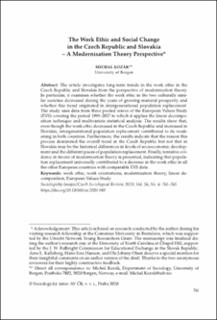The Work Ethic and Social Change in the Czech Republic and Slovakia – a Modernisation Theory Perspective
Journal article, Peer reviewed
Published version

Åpne
Permanent lenke
https://hdl.handle.net/11250/2732715Utgivelsesdato
2020Metadata
Vis full innførselSamlinger
- Department of Sociology [424]
- Registrations from Cristin [9558]
Sammendrag
The article investigates long-term trends in the work ethic in the Czech Republic and Slovakia from the perspective of modernisation theory. In particular, it examines whether the work ethic in the two culturally similar societies decreased during the years of growing material prosperity and whether this trend originated in intergenerational population replacement. The study uses data from three pooled waves of the European Values Study (EVS) covering the period 1999-2017 to which it applies the linear decomposition technique and multivariate statistical analysis. The results show that, even though the work ethic decreased in the Czech Republic and increased in Slovakia, intergenerational population replacement contributed to its weakening in both countries. Furthermore, the results indicate that the reason this process dominated the overall trend in the Czech Republic but not that in Slovakia may be the historical differences in levels of socioeconomic development and the different paces of population replacement. Finally, tentative evidence in favour of modernisation theory is presented, indicating that population replacement universally contributed to a decrease in the work ethic in all the other European countries with comparable EVS data.
